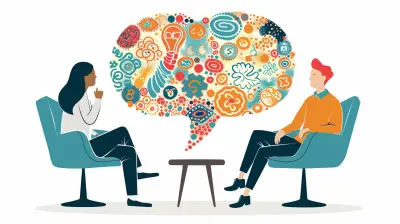The Role of Cognitive Behavioral Therapy in Achieving Mental Clarity
19 December 2024
When was the last time you felt like your thoughts were a tangled mess? Like a knot in your brain that you just couldn’t untangle? We've all been there. Life gets hectic, emotions run high, and before we know it, our minds are cluttered with worries, fears, and self-doubt. Mental clarity feels like a far-off dream. But what if I told you there's a way to cut through that mental fog? Enter Cognitive Behavioral Therapy (CBT), a powerful approach that has helped countless individuals regain clarity and take control of their thoughts.
In this article, we’re going to dive deep into the role of Cognitive Behavioral Therapy in achieving mental clarity. We’ll break down what CBT is, how it works, and why it’s so effective in decluttering the mind. So, grab a cup of coffee, get comfy, and let’s explore how CBT can help you sharpen your mental focus.

What is Cognitive Behavioral Therapy?
Before we can understand how CBT helps with mental clarity, we need to get a handle on what it actually is. Cognitive Behavioral Therapy, often abbreviated as CBT, is a type of psychotherapy that focuses on changing negative thought patterns and behaviors.Imagine your brain is like a computer. Sometimes, the software gets buggy and starts running on outdated or faulty programming. CBT helps you update that software by reprogramming how you think and behave. It doesn’t dig too deep into your past like some other therapies (although your past experiences can be relevant), but it’s more about addressing the here and now—your current thoughts, feelings, and behaviors.
CBT operates on the idea that our thoughts, feelings, and behaviors are interconnected. If you can change your thoughts (the cognitive part), you can change how you feel and how you behave. And when your thoughts are clearer and more positive, your mental clutter naturally decreases.
The Core Principles of CBT
Let’s break this down into bite-sized pieces. CBT is built on a few core principles:1. Cognitive Distortions: These are irrational, biased thoughts that distort reality. Think of them as mental filters that color your perception of the world. Common distortions include black-and-white thinking, catastrophizing, or jumping to conclusions.
2. Automatic Thoughts: These are the thoughts that pop into your head without you even realizing it. Often, they’re negative, and they can fuel anxiety, depression, or stress without you even being fully conscious of them.
3. Behavioral Activation: This is about changing your actions. If you're stuck in a rut of negative thoughts, CBT encourages you to take specific steps to act differently, which can then lead to more positive thoughts and feelings.
4. Problem-Solving: CBT equips you with tools to tackle problems head-on, rather than avoiding them or letting them spiral out of control.
5. Goal Setting: CBT is very goal-oriented. You work with a therapist to set specific, measurable goals that help you track your progress and stay motivated.
Now that we’ve laid out the groundwork, let’s talk about how CBT plays a pivotal role in achieving that elusive state of mental clarity.

How CBT Clears Mental Clutter
Mental clarity is all about having a clear, focused mind that isn’t weighed down by unnecessary worries or distractions. CBT helps achieve this in several ways:1. Identifying and Challenging Cognitive Distortions
We all have cognitive distortions—those pesky little thought patterns that lead us down the rabbit hole of negativity. For example, you might think, “I’ll never be able to do this—it’s too hard,” or “Everyone is going to judge me if I fail.” These thoughts are not only unhelpful, but they create unnecessary mental clutter, making it impossible to focus.CBT helps you identify these distortions and challenge them. You learn to ask yourself questions like, “Is this thought really true? What evidence do I have to support it?” By questioning your own thoughts, you start to see things more clearly, and the mental fog begins to lift.
2. Breaking the Cycle of Negative Thinking
Negative thoughts are like that annoying song that gets stuck in your head—it just keeps looping. CBT helps break that cycle. Once you're able to recognize your negative thought patterns, you can interrupt them and replace them with more balanced, rational thoughts.For example, instead of thinking, “I’m a failure,” CBT teaches you to reframe that thought into something more constructive, like “I made a mistake, but that doesn’t define who I am.” This shift in perspective can bring a breath of fresh air to your mental space, clearing away the fog of self-doubt and negativity.
3. Focusing on the Present Moment
One of the key techniques used in CBT is mindfulness. Mindfulness is all about focusing on the present moment rather than getting caught up in past regrets or future anxieties. When you’re fully present, you’re not worrying about what could go wrong tomorrow or beating yourself up over what happened yesterday. This allows your mind to quiet down and gain clarity.By practicing mindfulness, you train your brain to stay focused on what’s happening right now, which naturally declutters your mental space. The more you practice, the better you get at staying present, and over time, your mind becomes a much more peaceful place to hang out.
4. Improving Emotional Regulation
Emotions can be like a storm—when they’re out of control, they can wreak havoc on your mental clarity. CBT teaches you how to regulate your emotions more effectively, allowing you to respond to situations calmly rather than reacting impulsively.For instance, instead of flying into a rage when someone cuts you off in traffic, CBT helps you step back and ask yourself, “Is this worth my energy? Why am I reacting this way?” This kind of emotional regulation keeps your mind from spiraling into chaos, helping you maintain a sense of calm and clarity.
5. Building Resilience Through Problem-Solving
Life is full of challenges, and when problems pile up, it can feel overwhelming. This is where CBT’s problem-solving focus comes into play. Instead of letting problems sit in the back of your mind and add to your mental clutter, CBT teaches you to face them head-on.By breaking problems down into smaller, manageable steps, you can tackle them one at a time. This not only helps you move forward but also frees up mental space that was previously occupied by stress and worry.

Real-World Examples of CBT in Action
Still not convinced? Let’s look at some real-world examples of how CBT can clear mental clutter and help people achieve mental clarity.Example 1: Overcoming Social Anxiety
Let’s say you struggle with social anxiety. Every time you’re in a social situation, your mind gets flooded with thoughts like, “What if I say something stupid?” or “They probably don’t like me.” These thoughts can spiral out of control, making it impossible to enjoy the moment or think clearly.With CBT, you’d work on identifying these negative thought patterns and challenging them. You might start by asking yourself, “What evidence do I have that people don’t like me?” or “Why am I so worried about what others think?” Over time, these thoughts lose their grip on you, allowing you to focus on the conversation at hand and enjoy social interactions with more ease.
Example 2: Battling Procrastination
Procrastination is another common issue that can clutter your mind. You know you need to get something done, but you keep putting it off because of thoughts like, “It’s too hard,” or “I’ll never get it done in time.” These thoughts pile up until the task feels insurmountable.CBT helps you break this cycle by challenging those thoughts. You might reframe your thought from, “It’s too hard,” to “I can break this task into smaller steps and tackle it one piece at a time.” This helps clear away the mental clutter associated with procrastination, making it easier to focus and get things done.
Example 3: Managing Stress
Stress can be incredibly overwhelming, especially when it feels like you’re carrying the weight of the world on your shoulders. CBT helps you manage stress by teaching you how to reframe your thoughts, regulate your emotions, and focus on solutions rather than getting lost in worries.For example, if you’re stressed about a work deadline, CBT encourages you to focus on what you can control rather than stressing over what you can’t. This shift in perspective can significantly reduce your stress levels, allowing you to think more clearly and calmly.

The Long-Term Benefits of CBT for Mental Clarity
One of the best things about CBT is that the skills you learn stick with you for life. It’s not a quick fix or a band-aid solution—it’s a long-term approach to improving your mental clarity and overall well-being.By practicing the techniques you learn in CBT, you’ll continue to sharpen your mental clarity over time. You’ll get better at recognizing negative thought patterns, staying present, regulating your emotions, and solving problems. And as you do, your mind will become a much clearer, more peaceful place to be.
Conclusion
Cognitive Behavioral Therapy is like a mental decluttering tool that helps you cut through the noise and find clarity. By challenging negative thoughts, breaking unhelpful cycles, and building resilience, CBT can help you achieve a clearer, more focused mind. Whether you're dealing with anxiety, stress, or just the everyday clutter of life, CBT offers practical tools to help you regain control and achieve the mental clarity you’ve been searching for.So, if you’ve been feeling like your mind is a jumbled mess, maybe it’s time to give CBT a try. Who knows? You might just find that untangling your thoughts is easier than you think.
all images in this post were generated using AI tools
Category:
Mental ClarityAuthor:

Ember Forbes
Discussion
rate this article
13 comments
Savannah Alvarez
Intriguing insights! I’m curious how CBT uniquely fosters mental clarity in diverse individual experiences.
February 2, 2025 at 5:26 AM

Ember Forbes
Thank you! CBT promotes mental clarity by helping individuals identify and challenge negative thought patterns, enabling them to reframe their experiences and enhance self-awareness, regardless of their unique backgrounds.
Everett Hubbard
This article effectively highlights the benefits of Cognitive Behavioral Therapy (CBT) in enhancing mental clarity. It balances the discussion by addressing both the strengths and limitations of CBT, making it clear that while it can be a valuable tool, individual experiences and needs may vary significantly.
January 29, 2025 at 5:35 AM

Ember Forbes
Thank you for your insightful comment! I'm glad you found the article balanced and informative regarding CBT's benefits and limitations. Your observation about individual experiences is important in this discussion.
Nico McGrady
Cognitive Behavioral Therapy (CBT) is a powerful tool for mental clarity, helping individuals identify and challenge negative thought patterns. By fostering healthier perspectives, CBT empowers people to manage stress, anxiety, and improve overall mental well-being effectively.
January 25, 2025 at 4:12 PM

Ember Forbes
Thank you for your insightful comment! CBT truly plays a vital role in promoting mental clarity and well-being.
Ashira Fletcher
Cognitive Behavioral Therapy is like a mental GPS, helping navigate through the fog of intrusive thoughts and emotions. By reframing our perspectives, it paves the path to clarity, enabling us to steer towards healthier mindsets and more fulfilling lives. A true cognitive compass!
January 21, 2025 at 4:24 PM

Ember Forbes
Thank you for your insightful analogy! I appreciate your perspective on CBT as a guiding tool for navigating thoughts and emotions.
Dean McGeehan
Cognitive Behavioral Therapy effectively enhances mental clarity by identifying and restructuring negative thought patterns, fostering greater self-awareness and resilience, ultimately empowering individuals to navigate challenges with improved cognitive clarity.
January 18, 2025 at 5:37 AM

Ember Forbes
Thank you for your insightful comment! Indeed, CBT's focus on reshaping negative thoughts plays a crucial role in enhancing mental clarity and resilience.
Barbara McWhorter
Cognitive Behavioral Therapy (CBT) effectively enhances mental clarity by challenging negative thought patterns and fostering healthier cognitive processes. This evidence-based approach empowers individuals to gain insight, develop coping strategies, and ultimately improve their overall mental well-being and decision-making capabilities.
January 10, 2025 at 3:55 PM

Ember Forbes
Thank you for highlighting CBT's impact on mental clarity! It truly empowers individuals to reshape their thinking and improve overall well-being.
Kason Wyatt
CBT: Your mental clarity roadmap's clever guide!
January 4, 2025 at 3:33 PM

Ember Forbes
Thank you! I'm glad you found the guide helpful in navigating mental clarity through CBT.
Alisha McKay
Love this insightful piece! Cognitive Behavioral Therapy is like a mental spring cleaning—clearing out those pesky thoughts for a clearer mind. Remember, every step toward clarity is a step worth celebrating!
December 30, 2024 at 4:53 PM

Ember Forbes
Thank you! I’m glad you found it insightful. Celebrating each step in our mental journey is so important!
Icarus O'Brien
Cognitive Behavioral Therapy empowers individuals to navigate their thoughts, unraveling the complexities of mental clarity.
December 27, 2024 at 3:31 PM

Ember Forbes
Thank you for your insightful comment! Indeed, CBT plays a crucial role in helping individuals gain clarity by addressing and reshaping their thought patterns.
Bria Johnson
Because who doesn’t love thinking differently, right?
December 24, 2024 at 3:53 PM

Ember Forbes
Absolutely! Embracing different perspectives is key to personal growth and mental clarity.
Primrose Tucker
Like a mental janitor, CBT sweeps away the clutter of thoughts, revealing the shiny floors of clarity! Who knew untangling our minds could feel like a delightful scavenger hunt for serenity?" 🧠✨
December 21, 2024 at 3:24 PM

Ember Forbes
Thank you! CBT truly helps clear the mental clutter, leading us to a more serene and focused mind. Your analogy captures its essence beautifully! 🧠✨
Heidi McQuiston
Ah, mental clarity! The ultimate glow-up for your mind. CBT isn’t just therapy; it’s the detox your brain didn’t know it needed. Get ready to level up your thoughts!
December 20, 2024 at 4:31 PM

Ember Forbes
Absolutely! CBT is a powerful tool for detoxifying the mind and enhancing mental clarity. Excited to see more people embrace this transformative approach!
Emily McKinney
Cognitive Behavioral Therapy effectively enhances mental clarity by addressing negative thought patterns and promoting healthier cognitive frameworks for better well-being.
December 20, 2024 at 4:23 AM

Ember Forbes
Thank you for your insightful comment! I appreciate your recognition of CBT's role in promoting healthier thought patterns and mental clarity.
MORE POSTS

How to Cope with Relationship Stress in a Healthy Way

Meditation for Decision Making: Clarity in the Midst of Uncertainty

Mental Clarity Through Self-Compassion: The Power of Being Kind to Yourself

How Psychological Testing Can Help Diagnose Mental Health Disorders

Emotional Intelligence and Financial Decision-Making: A Surprising Link

The Connection Between Positive Psychology and Personal Empowerment

Mental Clarity and Intuition: How to Trust Your Inner Voice

Coping with Financial Anxiety and Economic Stress

The Impact of Test Anxiety on Psychological Assessments